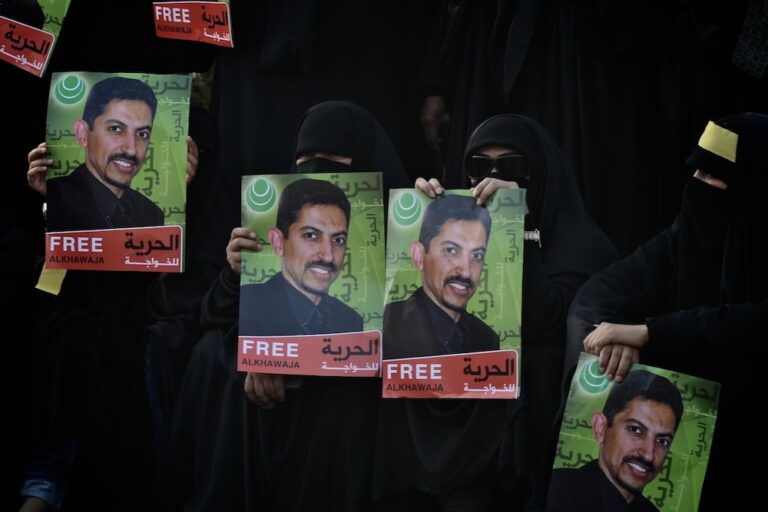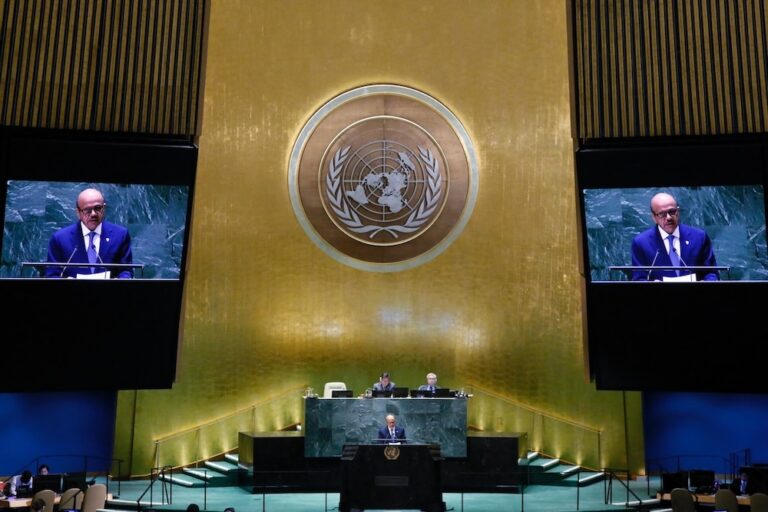BCHR President Nabeel Rajab was on the way to Greece when he was detained at the Bahrain airport by national security officers.
(BCHR/IFEX) – 7 December 2010 – The Bahrain Center for Human Rights (BCHR) expresses deep concern over the Bahraini authorities’ persistence in targeting and harassing human rights defenders. This was recently demonstrated by the ill-treatment inflicted upon the president of BCHR, Mr. Nabeel Rajab, through selective security measures practiced against him.
Rajab was detained for about one hour by national security officers upon his departure to Greece through the Bahrain National airport. He was threatened and his personal laptop and mobile phone were forcibly confiscated (in addition to the rest of the electronic devices that were in his possession). All files and information on these devices were copied, even family pictures and files related to his human rights work.
On 2 December 2010, as Rajab sat in one of the departure gates at the airport, after going through all the normal security procedures, he was approached by a member of the national security, named Khalid AlKhalifa. Rajab was asked to leave the departure gate and accompany the officer to the passport area. When they reached the security section he was asked to open his laptop, after which he was surrounded by a group of national security officers, some of whom were non-Bahraini and dressed in civilian clothes.
Rajab and his electronic devices were searched thoroughly. Khalid Alkhalifa then ordered some of the men to take the laptop and mobile phone to an unknown location. While Mr. Rajab did not mind or object to the inspection, even though it was selective and unusual, he did ask that the devices be searched in front of him, openly and transparently, expressing his concern that abusive or malicious files might be planted on them. AlKhalifa not only denied him this but also threatened him that if he did not hand over his devices the security officers would be forced to deal with him in a different manner, and they would make him regret his actions. To confirm this threat, another group of officers was called over. Afterwards, all of Rajab’s electronic devices were forcibly confiscated and taken to an unknown location for more than half an hour.
In that time one of the officers asked Rajab not to talk to or greet any of the travelers in the airport, or else they too would be targeted and interrogated. When a young acquaintance going to Dubai, unaware of the situation, recognized Rajab and shook his hand, the officers interfered and pulled the man away in front of all the travelers to an unknown location to search and interrogate him. Two minutes before takeoff, Rajab’s belongings were returned to him. He later found out that all their contents had been copied, including documents related to his human rights work or photographs of his family members. BCHR notes that in the past, the security apparatus has copied information and personal documents from other activists without justification or a legal order.
The BCHR president has been subjected to continuous targeting and harassment for years and at different levels. Some come in the form of a personal attack through smear campaigns using the media, such as the official television and radio channels, or newspapers close to the power and some of the columnists and editors working there. In some situations it even amounted to physical assault. The harassment has increased since the latest security crackdown began in August, as a defamation campaign was launched against Rajab. His image was published by the Bahrain News Agency and he was identified as one of the members of an alleged terrorist cell. Moreover, his picture has often appeared in local government newspapers. Rajab was banned from leaving the country but this ban was recently lifted, and his name was circulated to some Gulf and Arab states to make it more difficult for him to move around the region.
(. . . )


